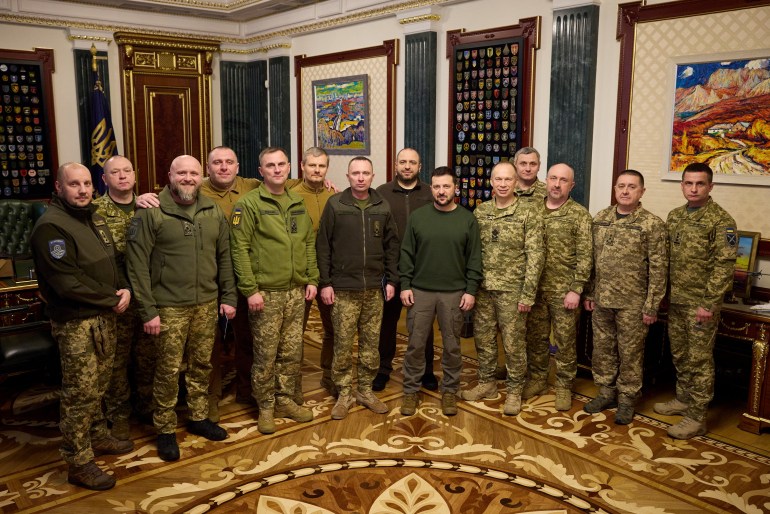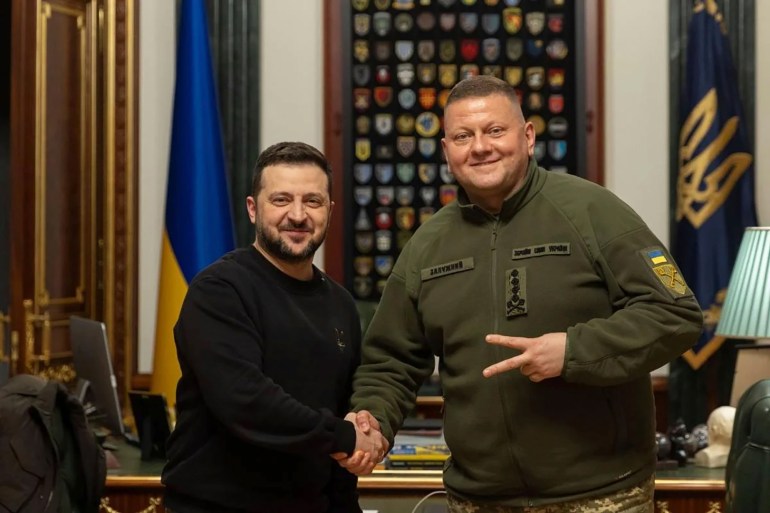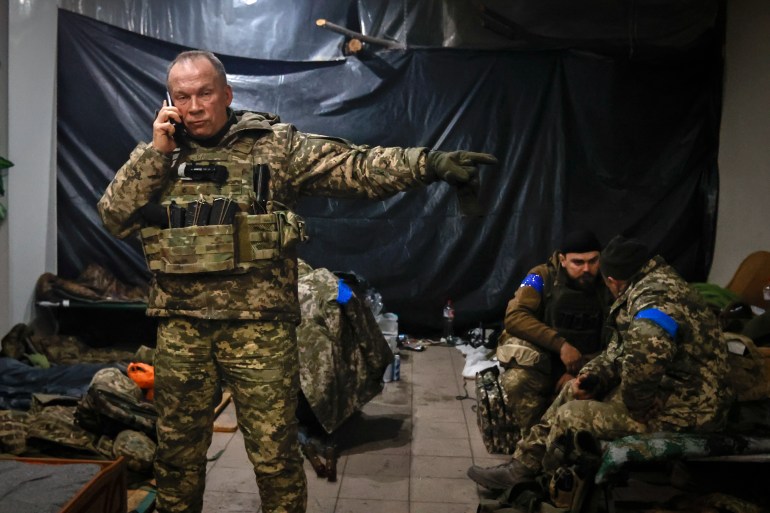Table of Contents
The new commander-in-chief of the Armed Forces of Ukraine, Colonel General Oleksandr Syrskyi has built a fearsome reputation as a military commander in the war with Russia, but he faces some major challenges, including how to mobilise new forces and combat corruption in the ranks.
Over the past week, President Volodymyr Zelenskyy has fired most of his top generals in an attempt to “reset” management of the country’s decimated, undermanned and undersupplied armed forces.
The list of 15 dismissed generals includes the popular commander-in-chief, Valerii Zaluzhnyi, who has been replaced by Syrskyi – described by some as a “butcher” with little regard for loss of human life. Some heads of combined forces, military reserve, ground and airborne forces, along with some of their deputies and advisers, have survived the cull.
“The first thought is that this is an absolutely unprecedented action,” said Nikolay Mitrokhin of Germany’s Bremen University, who has been writing detailed analyses of the Russia-Ukraine war since the conflict began in 2022.
“Apparently, it was coordinated with the new commander-in-chief, Syrskyi, who named the people he would want to work with as a team,” Mitrokhin told Al Jazeera.
The wave of dismissals follows the failure of last year’s counteroffensive to regain Russian-occupied areas in southern and eastern Ukraine, corruption scandals, dire delays to Western military aid and chaotic management of the armed forces.
However, the scale of dismissals reflects the way Zelenskyy has been managing Ukraine since coming to power in 2019.
“It’s very much in Zelenskyy’s style with his decision to ‘fire ’em all’, not only those who failed their work, but even those who belong to the wrong generation or team,” Mitrokhin said.
The only top officers who have kept their jobs are the ones who commanded successful operations against the Russian fleet on the Black Sea, along with some heads of the air force and air defence force who “demonstrate success or stability in repelling Russian attacks”, he said.

Challenges ahead
The new top brass faces a string of challenges – and mobilisation is number one.
Kyiv does not disclose its battlefield casualties, but Washington believes Ukraine has lost at least 70,000 servicemen.
The now-dismissed Zaluzhnyi had wanted to mobilise 500,000 men, but Zelenskyy rejected the idea fearing popular protests and citing limitations in training, housing and arming.
Thousands of Ukrainian men of fighting age are believed to have bribed their way out of the country – or crossed Ukraine’s borders illegally, either by land or even by swimming across the ice-cold waters of the Prut River near Moldova.
Some conscription officers have been arrested after receiving bribes of thousands or tens of thousands of dollars to “free” someone from military service and have now amassed enormous assets in Ukraine and abroad.
Zelenskyy fired each regional conscription officer, replacing them with battle-tested veterans vetted by intelligence services.
But the new appointees failed to mobilise enough men for the 1,000km-long front line amid devastating losses of manpower.

‘This man sent me to die like meat’
Meanwhile, some servicemen are snubbing the shake-up of Ukraine’s top brass.
One seasoned veteran who enlisted in 2014, after pro-Russian separatists took up arms against Kyiv in the southeastern Donbas region, and had just returned from the front line, was especially dismissive about new top general Syrskyi.
“This man sent me to die as if I were meat,” he told Al Jazeera on condition of anonymity, saying the servicemen who complain about their superiors or corruption end up dispatched to the most dangerous front-line spots to be killed.
He claimed that medical doctors are instructed to ignore life-threatening wounds and injuries.
“A man lost two legs and still was deemed fit for service,” he said.
Other servicemen have reportedly complained about Syrskyi’s “butcher” tactics of neglecting human losses.
Syrskyi addressed these concerns in his first public speech on the new job.
“The life and health of servicemen has always been and is the main value of the Ukrainian army,” Syrskyi said on February 9.
The former deputy chief of the General Staff of the Armed Forces of Ukraine said Syrskyi is indeed “harsher” than his predecessor.
“Judging by his previous actions, he has a harsher approach in preparing and organising action and in holding his subordinates accountable,” Lieutenant-General Ihor Romanenko told Al Jazeera.
However, Syrskyi “is very scrupulous in preparing for hostilities, he goes into details, thoroughly studies matters of supply and so on”, Romanenko said.

Major successes under Syrskyi
While heading land forces, Syrskyi has been credited with two significant successes. One was the defence of Kyiv in February and March 2022, when tens of thousands of Russian soldiers tried to encircle the capital from the north.
Under Syrskyi’s command, small and highly autonomous groups of servicemen and irregular forces attacked Russian troops and armoured vehicles, cut off their supply lines and used drones for reconnaissance and surprise attacks.
One such serviceman was Bohdan Yavorsky, whose group of two dozen men ambushed a column of armoured vehicles in the northern Kyiv suburb of Bucha.
They immobilised the column by bombing the first and last vehicles and showering the rest with grenades and Molotov cocktails before speeding away and calling in an air raid to destroy the rest of the vehicles.
“This crap was stinking in the centre of Bucha for a month until it was removed,” Yavorsky told Al Jazeera in August 2022.
Syrskyi’s second big success was also in 2022, when he clandestinely amassed light infantry in the eastern Kharkiv region to break through Russian defences and liberate the entire region despite Russia’s superiority in artillery.
Addressing delays to Western aid
Another major challenge for Ukraine’s new top brass is delays in Western aid.
The 27 member states of the European Union agreed earlier this month to unblock 50 billion euros (about $54bn) in aid, but Republicans in the US Congress aligned with GOP presidential frontrunner Donald Trump still object to a $60bn package from the United States.
“It’s obvious [the EU] won’t solve everything without the Americans. That’s why the American conundrum has been going on for too long, which is definitely not positive for us,” Romanenko said.
The delay is not ruining Ukraine’s economy but is absolutely crucial for the military.
“The economy is not going to crash until the year’s end,” Kyiv-based analyst Aleksey Kushch told Al Jazeera.
“The main problem is the supply of arms and ammo. Without US aid there’s not enough money for that.”

